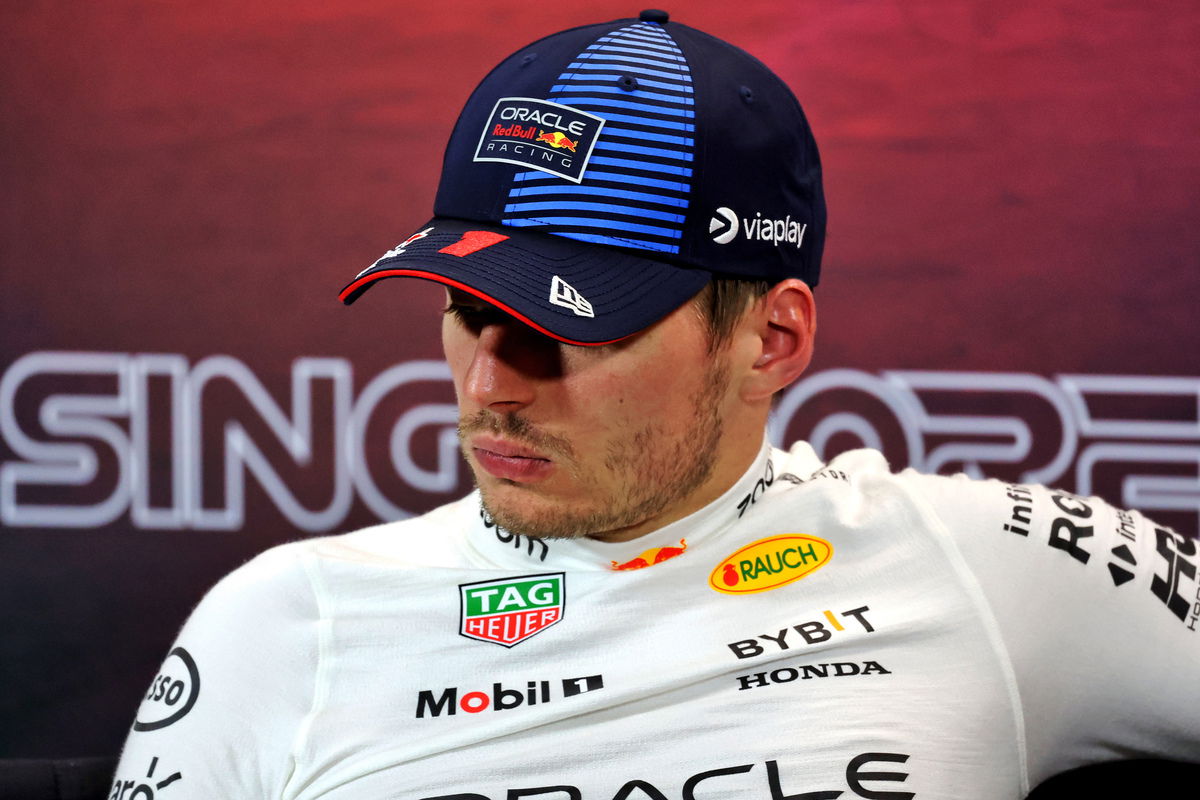

In the post-session press conference he met the minimum requirement to satisfy his obligations under the sport’s rules. And he made no secret of what he was doing, or why he was doing it.
His clipped responses and unwelcoming demeanour were his way of protesting the penalty he was given for swearing during an FIA press conference on Thursday.
It wasn’t a response to the journalists, the questions, his performance, or even the press conference itself, he was being deliberately defiant towards the FIA but in a manner that meant he could not be punished further.
He was unhappy with a penalty he received the day before, and felt victimised over a topic that is, to most in the paddock, a complete non-issue when there are far bigger concerns to focus on.
But it was more than that; it was a stance against the FIA president, Mohammed Ben Sulayem, and his comments about the language used by drivers.
And in many ways he was right in his response, though the message was confused in the malaise.
Verstappen is in many respects a libertarian; accepting of free will and differing opinions, believing individuals are accountable for and to themselves.
When Kyle Larson declared himself the best driver in the world, better than the three-time F1 champ, he brushed it aside. He didn’t care.
Opinions and words, to Verstappen, don’t mean anything. Hence, in his view, swearing doesn’t mean anything – provided it’s not abusive.
So when he dropped an f-bomb on Thursday as he described his car, he thought nothing of it; it was just a word, it’s how he speaks, so what’s the problem?
But he’s also not an idiot and could read the room. He immediately gauged the reaction and realised what was going on.
In the days prior to the Singapore Grand Prix, Ben Sulayem made comments about the language drivers use.
Those have not been received well and taken to mean a blanket ban on potty mouths, evidenced by the reaction from drivers during Thursday’s press sessions where the common opinion was ‘if you don’t like us swearing, don’t broadcast our radio’.
And that’s probably not what the FIA supremo meant. There is a difference between an emotional reaction under pressure and the language used in general discourse. The latter is the key point, which was missed by Verstappen and his peers.
Language in official media sessions should be moderated. It must be fan friendly, family friendly, because it is how the sport communicates with its audience. There is an obligation to set a good example.
In the car, however, is a different manner.
Once a driver is strapped in, his conversations are not intended to be heard by the wider world, they are designed for his engineer and the pit wall. They are private exchanges that we eavesdrop on.
And for that there should be a distinction, though currently there is not.
The world feed plugs into those chats and plays them out, on delay, to the wider world to add to the entertainment, drama, and tension.
Snippets are chose to offers an insight into what is happening behind the curtain and showcase the pressure and emotion.
Is it fair that we then complain about the language that’s used? Team radio is not intended for us, we have simply intercepted it for our own amusement.
But there are bigger considerations too.
In Austria, Yuki Tsunoda was heavily fined for offensive language over team radio.
It was a dumb thing to say and there is no defence for it, it has no place in the sport or anywhere else, but it gained far wider coverage because it was available for us to hear.
And because of that, he was slapped with a €40,000 fine (half of which was suspended).
Was that fair on Tsunoda – a Japanese driver speaking English with an Italian team on a private communication channel?
And is he alone in uttering such remarks? Have others made comments that might have been highly insulting that weren’t caught by the television production?
That creates a worrying issue where the choices of a television director can have a sporting impact, such was the case for Tsunoda.
Of course, that wasn’t the case for Verstappen in this instance, but it is seemingly that implication that he was protesting.
There are three potential solutions.
The first is that all radio is reviewed and language penalised appropriately and equally.
Again, though, these are private channels and what may be offensive to one person may not be another – take Verstappen’s stance on swearing as a prime example.
Such an approach is extreme and unrealistic, and would be a significant overreach, not to mention a waste of resources.
Another option is a blanket ban on team radios on the broadcast, and there is a lot to be said about it.
Aside from the potential regulatory side of things as already discussed, there is a sporting element.
Currently, teams can be advantaged or disadvantaged by the choices of the television director.
While the radio is predominantly designed for the enjoyment of fans, it is an information source that rival teams can exploit.
By cherry picking snippets from one or two teams, they are potentially disadvantaged as their private communications are shared with the world.
It’s why they speak in code, to reduce the value their radio chatter offers. So if they’re speaking a deliberately misleading language, what value does it actually have?
And there is precedence for its removal; the race control radio was broadcast during the 2021 season but hasn’t been since. If the FIA has decided that it shouldn’t be monitored, how is it fair that the teams and drivers are?
From a sporting purity standpoint, radios should be removed from the broadcast, it is the only way to ensure all teams and drivers are treated fairly.
The third alternative, and the most likely or rational, is that we all simply get over it and accept that team radio will contain offensive language at times.
A more robust moderation process by FOM would do no harm but at the very least the conversations should be selected such that it adds to the entertainment without detracting from the sporting element – and certainly not highlight comments likely to land an individual in hot water.
The extension to that is, while team radio should be ignored in its entirety – including by the FIA – what is said in press conferences should be moderated.
So Max Verstappen has a point in his objection to the penalty, though the wires are a little crossed on what he’s actually protesting.
The officials were right to penalise him for foul language in Thursday’s press call, but team radio should be left well alone.
For now, Speedcafe has confirmed that there are no plans to change the way FOM uses team radio over its broadcast, though perhaps it needs to strengthen its moderation process, and the FIA turn a blind eye to what are private conversations.




















Discussion about this post